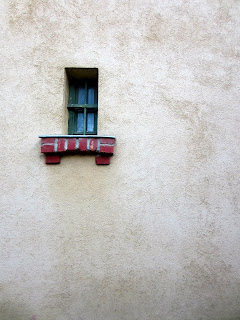Each day I see her. Maybe “have to
look at her” would be more appropriate wording, because she’s not exactly a
pretty sight.
 She is always wearing the same
baggy scarlet sweatpants tucked into a frayed pair of white tube socks. The tube socks are peeking out of the top of
a pair of black pleather boots, the pointed toes worn away just enough to allow
her too-large feet to work the tip of her socks out through the hole as the
days goes on, creating a strange little dirty sock nub. Her magenta sweatshirt
might be the most disturbing part of the whole ensemble- no one has told her
that it is inappropriate for 40-year-old women to wear pictures of Hannah
Montana across their chests. Her body moves in a painful rhythm as she sweeps
the streets of my bloc apartment complex. Every few steps her shiny red
fingernails pull her rose-scented cigarette up to her lips and she takes a long
drag. Sweep, sweep, drag. Sweep, sweep, drag.
She is always wearing the same
baggy scarlet sweatpants tucked into a frayed pair of white tube socks. The tube socks are peeking out of the top of
a pair of black pleather boots, the pointed toes worn away just enough to allow
her too-large feet to work the tip of her socks out through the hole as the
days goes on, creating a strange little dirty sock nub. Her magenta sweatshirt
might be the most disturbing part of the whole ensemble- no one has told her
that it is inappropriate for 40-year-old women to wear pictures of Hannah
Montana across their chests. Her body moves in a painful rhythm as she sweeps
the streets of my bloc apartment complex. Every few steps her shiny red
fingernails pull her rose-scented cigarette up to her lips and she takes a long
drag. Sweep, sweep, drag. Sweep, sweep, drag.
She is dirty and defeated. Maybe
that is why it stands out so much. It is perfectly pleated and lays across
her head in an attempt to hide her frizzed mass of once-black hair, now mixed
with stained orange sections and gleaming gray roots. It is not hastily pinned or knotted, but tied into a perfectly
symmetrical and dainty bow that rests along her uneven hairline. It is not stained or ripped, and I’m
sure that if I had the courage to approach her, it would not smell like the smoke and sweat that have saturated
every other part of her life.
Though she may not be able to
articulate such a thought, it is what remains of another world, another set of
thoughts, another way of life- all of which have been brutally taken from her
by time.
 At first, it is shocking to hear
the stories of her generation of Romanian’s nostalgia. A generation whose “Back
in my day…” stories include food rations, misguided dictators, and whispered
conversations in rooms with no power because of electrical shortages. But those
sacrifices brought along with them a comfort. Under Communism, she (as well as
everyone around her) had had what she needed. She had been a factory worker or
a writer, or maybe even an engineer. She was proud of her work. Each day she
came home with enough bread and vegetables for her family, and even had time to
travel on the weekends. Silent acceptance of the system was the only price she
had to pay for these luxuries.
At first, it is shocking to hear
the stories of her generation of Romanian’s nostalgia. A generation whose “Back
in my day…” stories include food rations, misguided dictators, and whispered
conversations in rooms with no power because of electrical shortages. But those
sacrifices brought along with them a comfort. Under Communism, she (as well as
everyone around her) had had what she needed. She had been a factory worker or
a writer, or maybe even an engineer. She was proud of her work. Each day she
came home with enough bread and vegetables for her family, and even had time to
travel on the weekends. Silent acceptance of the system was the only price she
had to pay for these luxuries.
Now, she watches the people of Romania file
past her each day as she sweeps the curb. Sometimes, she sees the few who had
the right connections after the fall of Communism buzz past in their shining
new cars. Sometimes, she sees the American girl with the huge backpack walk
past and try to analyze her thoughts so she can write to her family about “the
people over there” on her expensive laptop. Sometimes, she sees politicians
travelling through town, paying for the desperate citizens’ votes with meat and
beer. But mostly, she sees the families of Lupeni. There are so many children,
but not enough jobs. There is so much trash, but not enough space. Their new
“freedom” may have made them nearly invisible to the rest of the world, but she
cannot help but see them.
She, like all of the people who
pass her daily, remembers when she was able to be so much more.
That is why it is so much more than a floral headscarf.
That is why it is so much more than a floral headscarf.
No comments:
Post a Comment